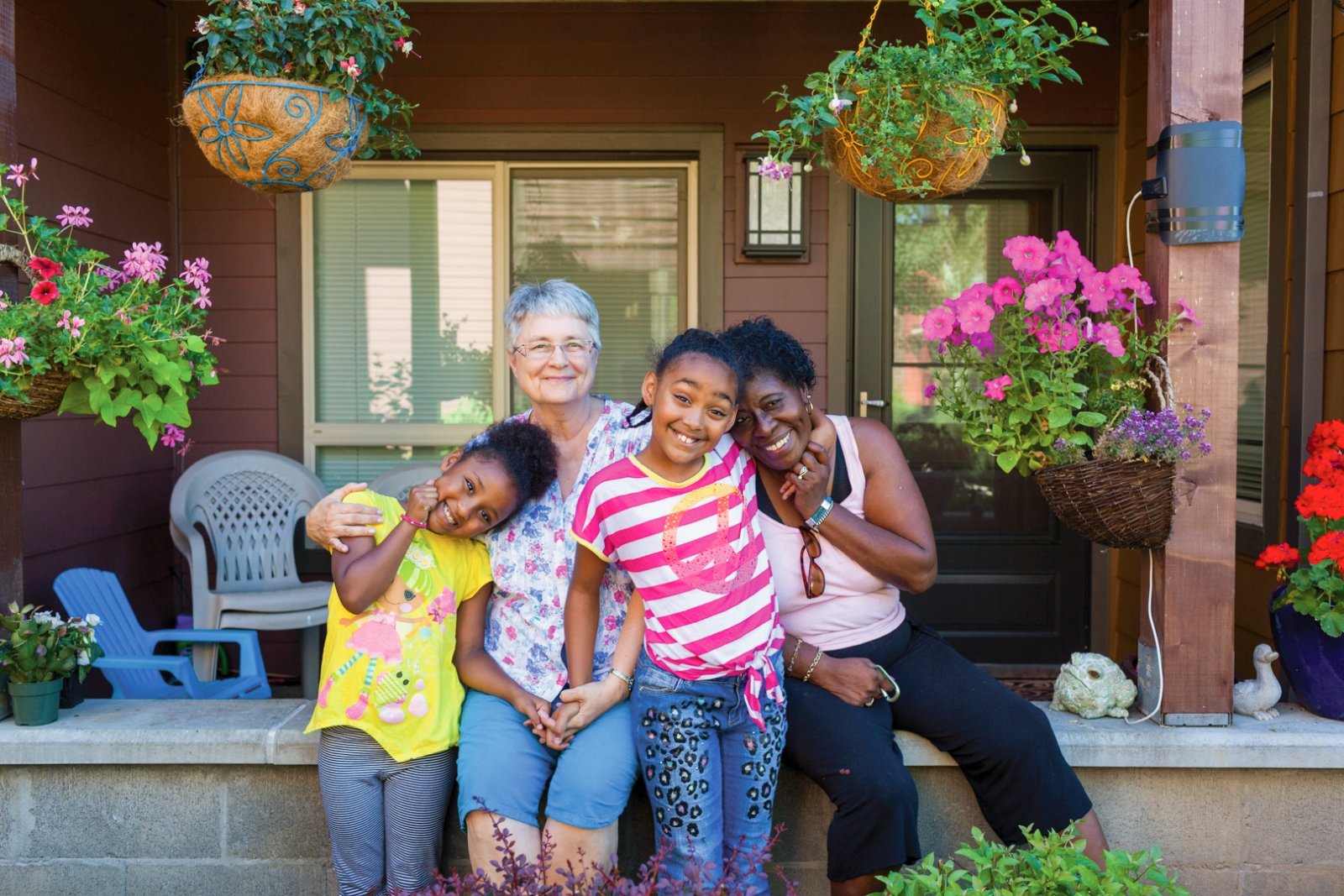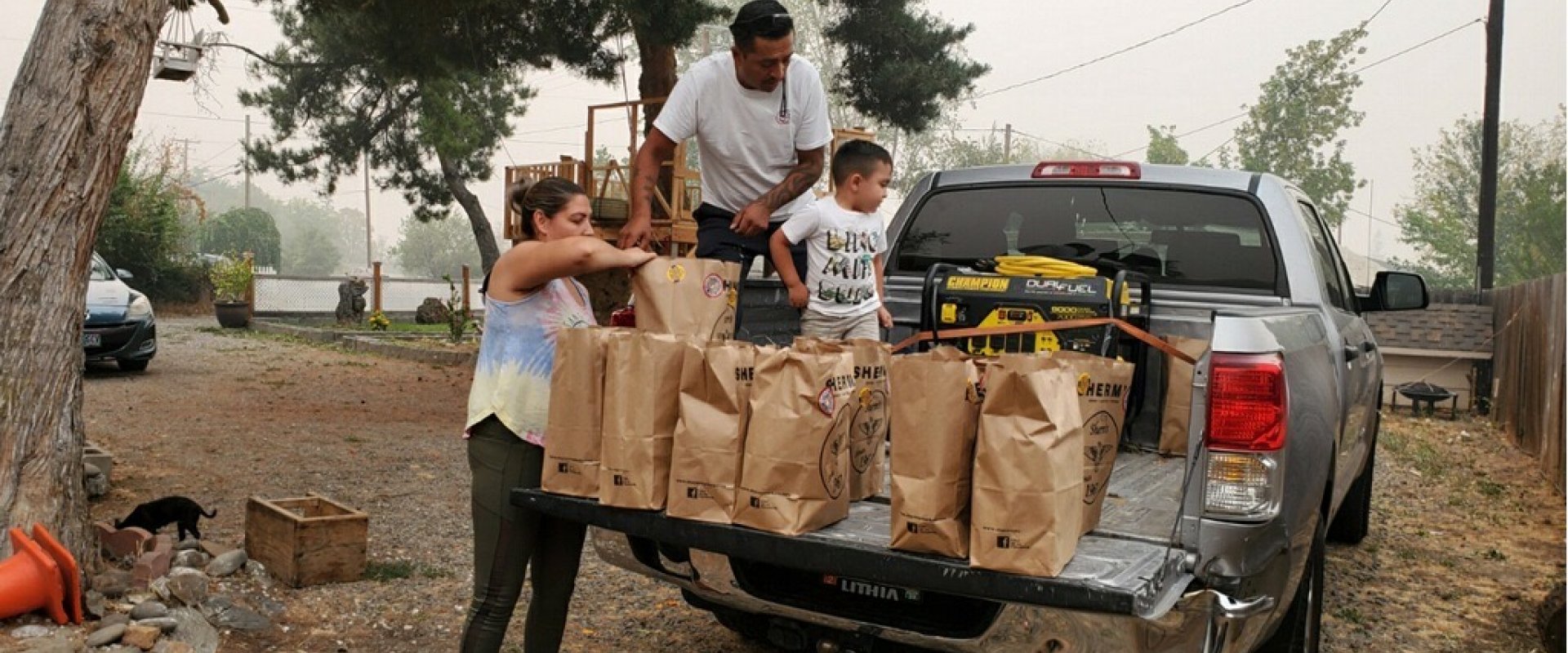Wednesday, Dec. 16, 2020
In this time of uncertainty, change and, yes, opportunity, we continue to be inspired by and grateful for the work of so many in the community during an unparalleled year of challenges.
While there is still so much to be accomplished, below are some critical moments of 2020 that your generosity and support helped make possible. Thank you for making a difference in our community and for our families.
In gratitude and full of hope,
Cindy Adams
President and CEO, United Way of the Columbia-Willamette
1. UNITING OUR COMMUNITY AROUND SERVICE
We kicked off 2020 with our biggest volunteer event of the year – the 13th Annual MLK Weekend of Service. Throughout the weekend more than 1,200 volunteers joined us for a day “on” in tribute to Dr. Martin Luther King Jr.
Volunteers made a difference by packaging food for families in need at SnowCap, weeding and winterizing the Native Gathering Garden at Cully Park, as well as cleaning up libraries and MLK Boulevard. By the end of MLK weekend volunteers of all ages collectively contributed over 3,500 hours of service, providing over $90,000 in service value to our region.
Due to COVID-19, this year’s MLK Weekend of Service has been postponed. However, there are still ways to stay safe and help your community. See our list of current volunteer projects and sign up today.

We Count Oregon reached out to individuals and families across the state to ensure a more accurate Census count in 2020
2. BOOSTING OREGON'S CENSUS COUNT
We were honored to serve as the fiscal agent and backbone for the Census Equity Funders Committee of Oregon (CEFCO) and the affiliated Oregon Census Equity Fund (OCEF). OCEF is a private-public pooled fund of $9.6 million to support Oregon’s Hard-to-Count Campaign, We Count Oregon.
The We Count Oregon campaign (the first Black, Indigenous, and People of Color led campaign in the history of Oregon statewide campaigns) designed a multi-pronged strategy, in partnership with existing social justice organizations as well as community ambassadors, to make the connection between participating in the Census and money, power and representation. The collective effort resulted in an increase in the overall self-response rate in Oregon for 2020 compared to 2010. Oregon’s 2020 self-response rate was 69.2% compared to 66.9% in 2010, representing a 3.2% increase. Moreover, Oregon’s tribal self-response rate (the community representing the highest level of undercount in 2010), was 49.34% in 2020 compared to 41.4% in 2020, representing a 7.94% increase.
Learn more about the unique collaboration behind Oregon's Census campaign.
3. MAKING UNIVERSAL PRESCHOOL A REALITY
This November Multnomah County voters overwhelmingly passed 26-214, a measure that will provide high-quality, tuition-free preschool for all 3 and 4-year olds.
United Way’s Early Learning Multnomah Parent Accountability Council (PAC) ensured parent voice was at the center of the Preschool for All Task Force, led by Multnomah County Commissioner Jessica Vega Pederson. Through PAC parents from African American, African immigrant, Asian, Latino, Native American and Slavic communities helped shape recommendations for expanding access to preschool across the county, especially for children in communities who are not currently being served.
"Preschool for All has given me an opportunity as a parent to have a voice where I’ve never had a voice before,” says Lydia Gray-Holifield, a PAC member. “As a parent of Brown and Black children in Multnomah County, finding affordable preschool - finding free preschool - is a miracle. Measure 26-214 will create an opportunity for our children to have a firm foundation going into kindergarten.”
Learn more about Multnomah County's groundbreaking preschool initiative.

Thousands of families were affected by the wildfires across Oregon (image courtesy of iStock)
4. RESPONDING TO THE WILDFIRES
In September, as wildfires and thick smoke threatened our communities, we launched a Wildfire Response and Recovery Fund to help families suffering devastating losses. With your generous support, we already allocated $189,000 toward immediate relief efforts to ten nonprofit organizations. We are also in the process of distributing another round of funds to organizations by the end of the year.
We are also learning from our nonprofit partners about longer-term needs such as the need for culturally responsive emergency preparedness including translation of emergency communications and materials. Through our collaborations with government officials at the local and state level, we are identifying opportunities to help shape disaster response policies supporting BIPOC communities moving forward.
Read more about our wildfire response and relief efforts.
5. BUILDING RESILIENT FAMILIES
In addition to the wildfires, thousands of families across our region are grappling with the health and economic impacts of COVID-19. Even before the pandemic, 1 in 3 families in our region was unable to pay for basic needs, having to make agonizing choices between paying for rent, utilities, childcare or healthcare. This year has further highlighted persistent inequities across our country as BIPOC communities have been disproportionately affected.
As we face these crises, we’re committed to rebuilding and reimagining more equitable and resilient communities. Our Resilient Families Initiative will provide supportive housing services, prioritizing families of color with the highest risk of being displaced and divert these families from becoming houseless. This will enable families to focus on their mental health and well-being, including mitigating potential chronic health issues related to being houseless.
Thanks to your generous support, in May we mobilized a community safety net, allocating $225,000 towards immediate COVID-19 response efforts to eleven nonprofit partners. This fall we worked with the Portland Housing Bureau to launch the COVID-19 Household Assistance Program, in which struggling Portlanders were able to apply for $500 in cash assistance to help pay for urgent needs. In total, the Household Assistance Program is expected to assist more than 31,000 Portlanders, with a particular focus on better serving BIPOC communities.
Read Lisette's story and learn how you can help families recover this holiday season.


